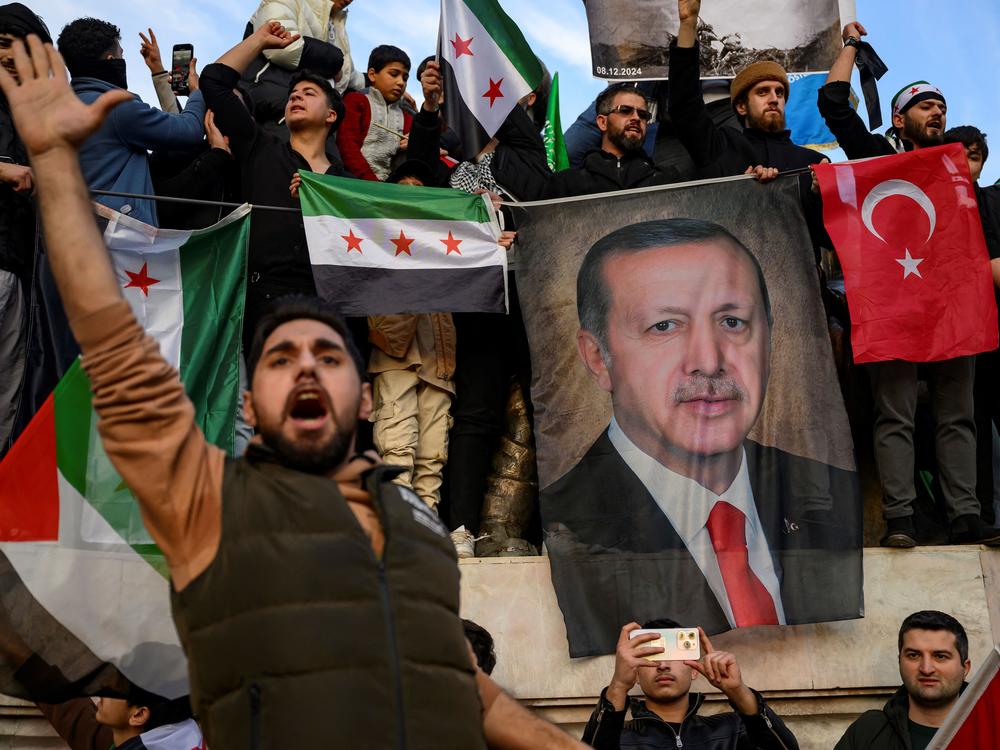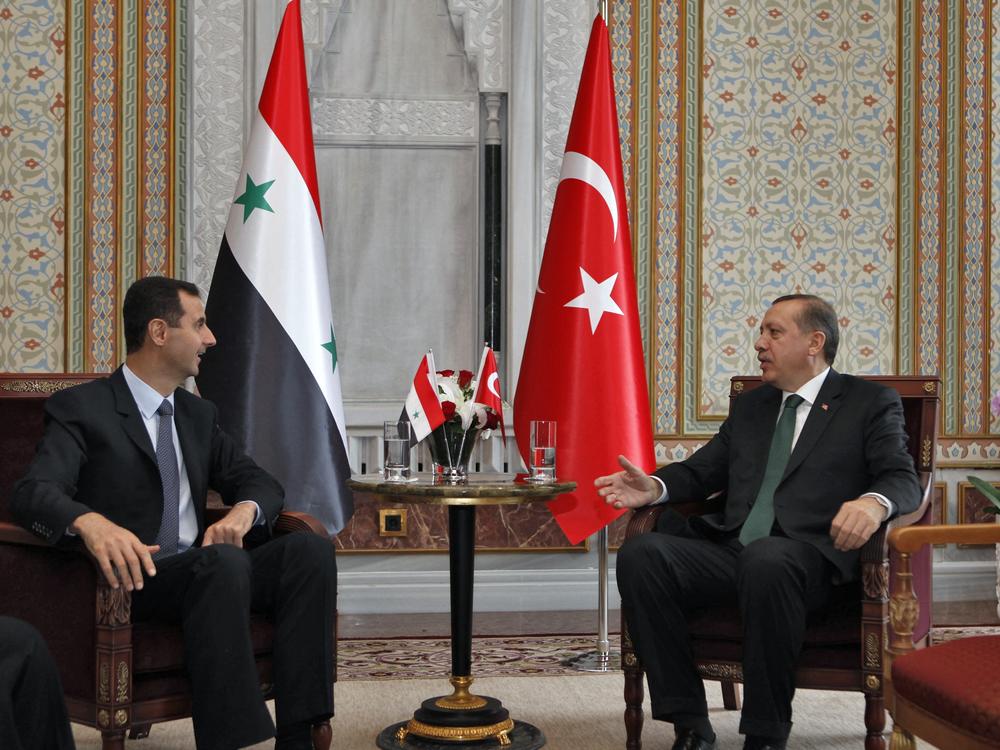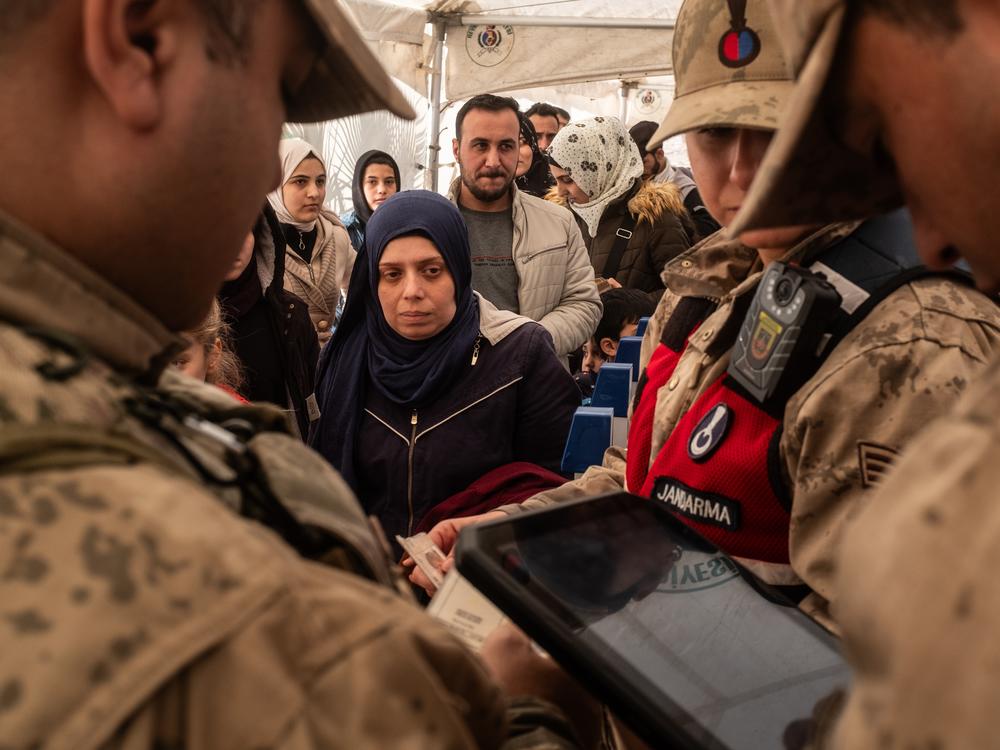Section Branding
Header Content
Turkey looks set to play an outsize role in shaping the new Syria after Assad
Primary Content
ISTANBUL — As the world watches Syria grapple with the aftermath of Bashar al-Assad's brutal regime and the formation of a new government, one country has emerged as having great influence over the new Syria: its neighbor to the north, Turkey.
In a press conference on Monday, President-elect Donald Trump said he believed that Turkey was behind Assad's downfall.
"Turkey did an unfriendly takeover without a lot of lives being lost," Trump said. "I think Turkey is going to hold the key to Syria."
The Turkish government has not publicly commented on Trump's remarks.
Loading...
What was Turkey's role in the Syrian civil war?
Before Syria's civil war erupted almost 14 years ago, Turkey enjoyed stable relations with the country. Turkish President Recep Tayyip Erdogan and Assad got along well, to the extent that their families even vacationed together once. But after Assad's brutal crackdown on peaceful protesters in 2011, Erdogan cut ties and put his intelligence and military resources behind rebel groups fighting Assad.
"Turkey's goal was, of course, at all costs unseating Bashar al-Assad," said political analyst Soli Ozel, who teaches at Kadir Has University in Istanbul.
Turkey, a NATO member that shares a long southern border with Syria, opened its doors to the largest number of Syrian refugees of any country, according to United Nations data — peaking at more than 3.7 million in 2021 — many of whom were linked with opposition groups and under threat from the Assad regime.
But by 2018, as Assad appeared to be winning the civil war — with the help of Russia, Iran and Iranian-backed Lebanese militia Hezbollah — Turkey's position came with a price. It faced domestic and economic difficulties, with the public blaming the Syrian refugees. And the country also faced security threats along its border with Syria.
Before the rebel groups moved on Assad's army in late November, Turkey's goals had shifted to ensuring that rebel enclaves like Idlib in Syria's north were stable, in order to prevent more refugee influx into Turkey, according to Turkish Foreign Minister Hakan Fidan.
"In Idlib, around 4 million Syrians lived under the control of Hayat Tahrir al-Sham," he said in an interview Sunday with Saudi Arabia's Al-Hadath TV, referring to the Islamist group, also known as HTS, that led fighters who toppled Assad and is now leading Syria. "There was always a risk of these people coming to Turkey during times of crisis."
He added, "To prevent these crises and maintain stability, we have remained in coordination with these groups, and through this process, we had the opportunity to get to know them."
In the months before the surprise rebel takeover of Assad-controlled areas, the Turkish government was under heavy domestic pressure to resolve the refugee crisis. Opposition politicians saw the government's support of rebel groups as a strategic mistake. Erdogan's administration had even begun to explore the possibility of mending ties with Assad, but it never came to fruition.
Now, after more than a decade, there's a sense of vindication in Ankara, Turkey's capital, that it wasn't all for nothing.
"A lot of people reflect on this in the sense that Turkey is a winner. It has proximity, it has influence. It has troops more than anything else," Ozel said.
What kind of influence will Turkey have on the new Syrian leadership?
Turkey is already visibly active in Syria. The Turkish Embassy in Damascus is up and running. And Turkey's intelligence chief paid a visit to Damascus last week and met with the leader of HTS, Ahmed al-Sharaa — formerly known by his nom de guerre, Abu Mohammed al-Jolani — who is now the de facto leader of the new Syrian administration.
In his interview with Al Hadath TV, Fidan said that Turkey has been sending messages from Western and regional countries to the new Syrian leadership in an effort to moderate HTS. The group formed as an affiliate of al-Qaida in 2011. Turkey, the United States and the United Nations Security Council have designated HTS as a terrorist organization. But since defeating Assad, the group has portrayed itself as more moderate and inclusive of other religions and minorities, with encouragement from the Turkish government.
"There were certain principles that most parties seemed to agree on. These include preventing terrorist organizations from benefiting from Damascus in the new era, ensuring good treatment of minorities, especially Christians, Kurds, Alevis and Turkmen, and establishing an inclusive government," Fidan said.
In an interview with Turkish newspaper Yeni Safak on Wednesday, HTS leader Sharaa said there would be "strategic relations" between the two countries.
"Of the many countries Syrians sought refuge in, Turkey welcomed them and respected them the most. I hope that Syria won't forget this kindness," Sharaa said.
He added that Syria's rebel takeover was a win for Turkey: "This victory is not only the victory of the Syrian people but also of the Turkish people."
Ultimately, analysts say, Turkey doesn't control HTS and many questions remain about what the new Syrian administration will shape up to be. These are potential challenges for the Turkish government, according to Ozel.
"If HTS gains more power, how much more amenable is it going to be to Turkey's suggestions, recommendations? That remains to be seen," Ozel said.
But experts say the new Syrian leaders will have to rely on Turkey to help them establish public order, form institutions and provide resources, like water and electricity. With much of Syria destroyed, Turkish construction companies are likely to seek a lead role in reconstruction.
"We trust that Turkey will transfer its experience in economic development to Syria," Sharaa told Yeni Safak newspaper.
Then there is the matter of the Syrian refugees in Turkey. Many of them now speak Turkish fluently and have business relations and other ties with Turkey, which could provide more means of influence for the Turkish government, should they return to Syria.
What are Turkey's goals in Syria now?
Laying out their goals in recent media interviews, senior Turkish officials have said their first priority is to dismantle the Kurdish fighter group in Syria known as the YPG.
But the YPG is a significant part of a Kurdish coalition — the Syrian Democratic Forces (SDF) — that the United States provided with weapons to help fight against the Islamic State group.
Turkey says the YPG is the Syrian arm of the Kurdistan Workers' Party (PKK), a separatist group that has fought Turkey for over four decades and is listed as a terrorist organization by Turkey and the U.S.
Turkish officials said they are asking the U.S. to reassess its position with the YPG.
So far, U.S. officials have not signaled any changes to their policy of supporting the Kurdish coalition.
On Tuesday, State Department spokesperson Matthew Miller said a U.S.-brokered ceasefire between Turkey and the Kurdish coalition forces in Manbij has been extended until the end of the week.
Miller said the U.S. understands Turkey has "legitimate concerns" about some of the fighters in Syria and is talking to Turkish authorities "to find a path forward."
Turkish officials said their other objective is the formation of a stable and united Syria.
"We want both a civil and democratic state," Foreign Minister Fidan said.
Turkey's defense minister also offered military support and training to the new leaders of Syria.
"I think Turkey will be there to help with the new administration that will be formed there," said Mustafa Kibaroglu, director of graduate studies in political science and international relations at MEF University in Istanbul. "Because what happens there has a direct bearing on Turkish prosperity, security, everything, so we cannot just turn a blind eye."
Will Turkey play a bigger role in the region as well?
Analysts expect Turkey to be influential in the Middle East, but not to seek hegemony in the way that Iran has with its proxies Hezbollah in Syria and Lebanon and the Houthis in Yemen.
Turkish Foreign Minister Fidan appeared to send a message to Middle Eastern leaders that outlined Turkey's vision for the region.
"By standing shoulder to shoulder, we must establish our own interests and order in the region," Fidan said in the TV interview on Sunday.
"We do not want Iranian domination in the region, nor do we want Turkish or Arab domination," he added.
Kibaroglu, of MEF University's graduate school, agrees. "We have seen how things may turn up in the negative sense for those who try to dominate the region," he said. "We have seen the role Iran played especially since 1990s and now they had to withdraw their troops and paramilitaries and proxies to a great extent."
Analysts say some of the Turkish public is wary of deeper involvement in the Middle East.
"My hunch is that the Turkish security elites have learned their lessons from the earlier period when that [domination] was very much on their agenda," Ozel said. "Turkey can be very influential as an actor, but within limits. And if it manages the situation well, it will benefit heavily."



